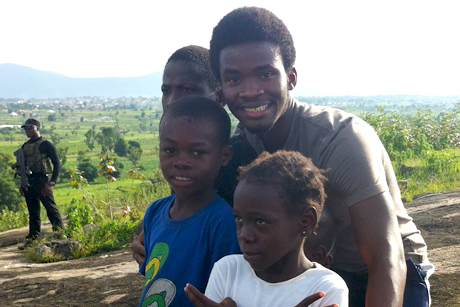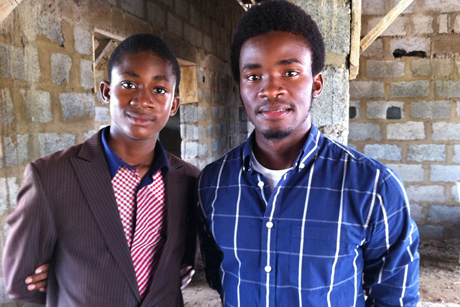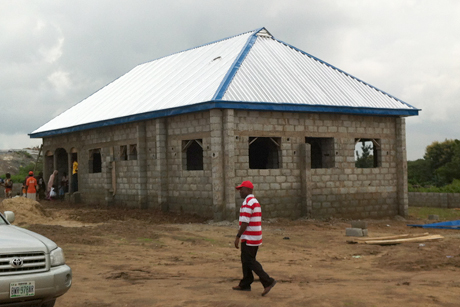Cornell junior brings change home to Nigeria
By Mark Ezzo



Kelechi Umoga ’15 spent this past summer leading the construction of a health care clinic in the Jeida village of Abuja, Nigeria.
“We literally wept for this village considering the absence of very basic necessities of life, such as clean water, public toilet, electricity, etc.,” said Umoga, a human biology, health and society major in the College of Human Ecology. “The fact that a village not so far from the ultramodern city of Abuja, the country’s capital, could exist without the vital social facilities was something we could not rationalize.”
Umoga’s project, Bridging the Gap 2013, was one step in a four-pronged intervention strategy. After high school, Umoga took a gap year and joined the Evangelism and Missions Ministry of the Presbyterian Church of Nigeria, which recognized that the Jeida village was in need of urgent help. During Umoga’s gap year and thereafter, the ministry helped bring a school, two blocks of public toilets and a borehole to the village. Umoga’s final goal, a health care clinic, required more funds than the church group had to offer.
“I am pursuing a minor in global health, and a critical element of the minor is an approved eight-week field experience in which students live and work abroad in a resource-poor setting,” Umoga said. “The purpose is to challenge students to apply their classroom learning to a field setting and to deepen their understanding of the health problems that disproportionately affect the resource poor.”
Last spring, the Davis Projects for Peace program granted Umoga $10,000 to fund construction of the clinic. Additionally, Cornell’s Office of Academic and Diversity Initiatives and Office of Engaged Learning + Research contributed to the cause, along with Umoga’s church.
“Receiving a grant to implement a project in my home country of Nigeria sounded exciting, but the execution was undoubtedly the most demanding task I have ever embarked on,” Umoga said. “Every step of this project was plagued with challenges; thus, my sustained fortitude was of utmost importance.”
Construction work was broken into major stages, from laying of blocks to roofing the clinic. From the project’s onset, Umoga recalled trips to the lumberyards where his knowledge of basic arithmetic was essential to calculate costs, in response to the dishonesty of some vendors.
“In the same vein, construction work was not void of challenges,” Umoga continued. “A few weeks into the construction, I discovered that the bricklayers and masons left each day for lunch at about midday and never returned, yet they demanded full-day wages.” Umoga responded by hiring a supervisor to stay on site and monitor the workers’ progress. In the face of such adversity, Umoga said he was comforted by the respect he received from his team.
At the end of his eighth week in Jeida, Umoga said, the clinic had been roofed and comprised two consultation rooms, a pharmacy, a dressing/injection room, a laboratory to carry out basic tests, a delivery room and an on-call room.
“Most importantly, Bridging the Gap 2013 gave communities a reason to believe in the unconditional and sacrificial nature of love,” Umoga said. “Although none of us were natives of the village, our desire to serve them was a clear demonstration of the notion that even in the absence of physical ties, love was still feasible.
“When the clinic is up and running, I plan to go on annual trips to the village with Cornell students who are interested in completing their field experience in Nigeria. There, aside from shadowing doctors in the clinic, they can be challenged to help develop initiatives or programs that can help improve health care and hygiene in the village and other neighboring communities.”
Mark Ezzo ’14 is a writer intern for the Cornell Chronicle.
Media Contact
Get Cornell news delivered right to your inbox.
Subscribe